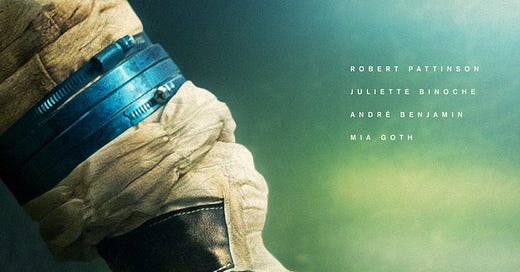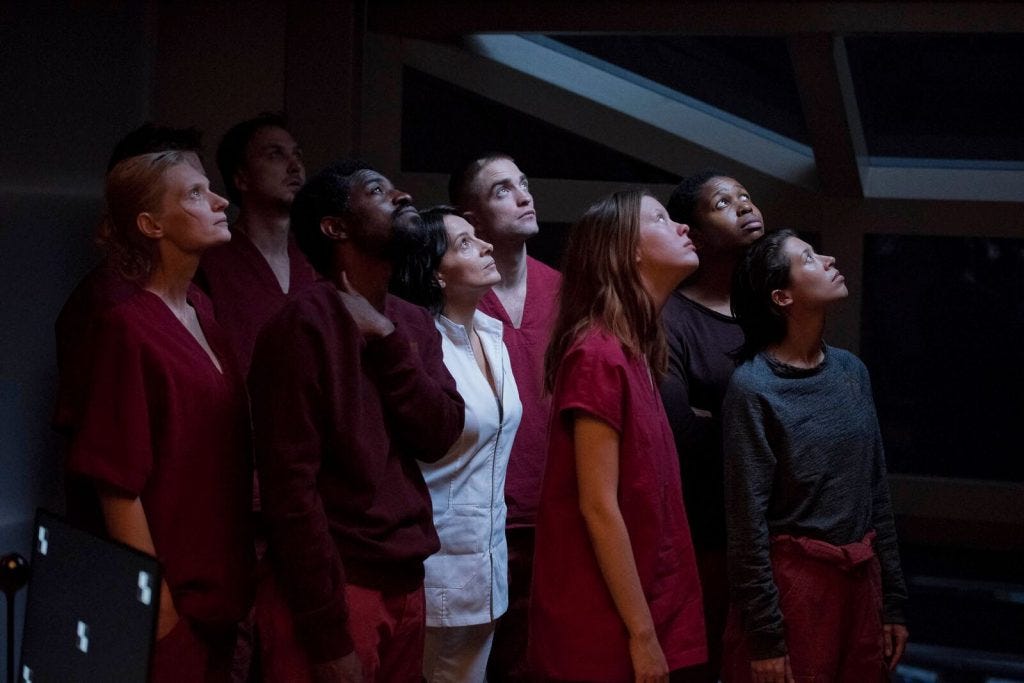Directed by Claire Denis
France & UK, 2018
Flying into a black hole has to be the most clichéd narrative of ‘cerebral’ science fiction. After receiving universal praise from ReidsonFilm and picking up our award for Best Cinematography with Beau travail in our last season, we were expecting great things of Claire Denis’s existential space thriller High Life. The director herself said this about film:
“No other art form is as simultaneously, trivial, vulgar and sublime as cinema.”
Unfortunately, just drop the sublime and what you are left with is High Life.
Science fiction often requires a willingness to suspend your disbelief in exchange for a thought-provoking narrative and engaging characters. With High Life we have a story told in flashback that only serves to confuse, and the two lead protagonists, played by Juliette Binoche and Robert Pattinson, are supported by a cast considered so redundant that they are literally jettisoned out of an airlock midway through the film.
Lifting the prison-in-space setting from the criminally underrated Alien 3, we have a band of nine death-row convicts offered the chance of redemption by flying their spaceship into a black hole. The aim: to harness the rotating energy from the lip of the black hole for Earth. What could possibly go wrong? Well, as Professor Exposition explains to us on a brief and jarring diversion to a train journey back home, the crew are unaware that this is a suicide mission.
The ship’s medic, Doctor Dibs (Binoche), uses a regimen of assorted sedatives to keep the crew in order. Bizarrely, on board they also have a small chamber for other ‘recreational’ pleasures – think of the Orgasmatron from the Woody Allen’s 1973 comedy, Sleeper. Serving a sentence for having murdered her own children Dibs busies herself collecting sperm from the men and implanting it into the female crew while they are sleeping, in the hope of creating a child. She has an eye for Monte (that’s Robert Pattinson – so who wouldn’t?) and whispers to him:
“I’m obsessed with reproduction.”
He is the one man that declines to use the Wankbox, so she sedates him and rapes him in his sleep.
As expected, amidst much flowing to and fro of various bodily fluids, the crew starts to break down and one by one they die, either killing each other or themselves. André 3000 (yes – of Outkast and Hey Ya!) slips off into the spaceship garden and opts for suicide – arguably the only rational response to being stuck on the ship with this bunch. It is a shame though, as he is one of the few characters played with a sense of genuine human agency and he also delivers one of the film’s best lines. When Elektra (Gloria Obianyo), another black crew member, dies, he comments:
“Even up here the black ones are the first to go.”
After unknowingly being inseminated by Monte’s sperm, one of the crew starts to leak breastmilk and then precipitously gives birth just before she too dies. This leaves Monte alone, a single father nursing the girl to adolescence just in time for the couple to fly into the said black hole. Narratively, this all makes about as much sense as Kanye West’s rap lyrics.
Filming the body, and using the corporeal form to convey emotion is a key constituent of Clare Denis’s work, but in contrast to the understated, latent eroticism of a film such as Beau travail here it is both heavy-handed and on the nose. Nowhere more so than in one climactic (!) scene where Dr Dibs mounts what looks like a mechanical bull from a rodeo and indulges in a wild display of onanistic sex.
Juliette Binoche is a brave actor and watching her on screen can be an enthralling experience, but there is a fine line between ham and Hamlet and this is the worst performance I’ve seen her give since 1992, when she and Jeremy Irons chewed up the scenery in Louis Malle’s Damage. Robert Pattinson tries hard as a murderer turned unwitting father, and in a performance with sparse dialogue he does on occasion break through the opacity of the script to make a connection.
At the start of the film Monte is teaching his baby daughter her first word: strangely, it is ‘taboo’. Fast forward fifteen years and we realise that incest is the only possible means of continuing life on the ship. A challenging idea that Denis flirts with but doesn’t really take anywhere. Pattinson, like the rest of the crew, doesn’t seem at all engaged with the ship’s mission and to be honest neither does the film’s director. High Life is a film that could have been set anywhere… perhaps it would have worked better in the desert.
I’m so sick of brooding sci fi…take me back to 80s synths, puppets and lasers. Now it’s just climate change metaphors and sad middle-aged men gazing into the abyss - C
Reids’ Results (out of 100)
C - 62
T - 61
N - 57
S - 49
N’s one line review of High Life: Bit mid can't lie
🎁 ❄️ 🎁 ❄️ 🎁 ❄️ 🎁 ❄️ 🎁 ❄️ 🎁 ❄️
And coming next is the ReidsonFilm Xmas film. It actually came down to the use of a casting vote by our occasional guest, J, as we had a tie between John Waters’ Female Trouble and the eventual winner - nominated by Gareth Bradwick, fellow Substack film enthusiast over at Popped. So dropping into your inbox on the 25th December will be our take on Jingle All the Way(1996).






